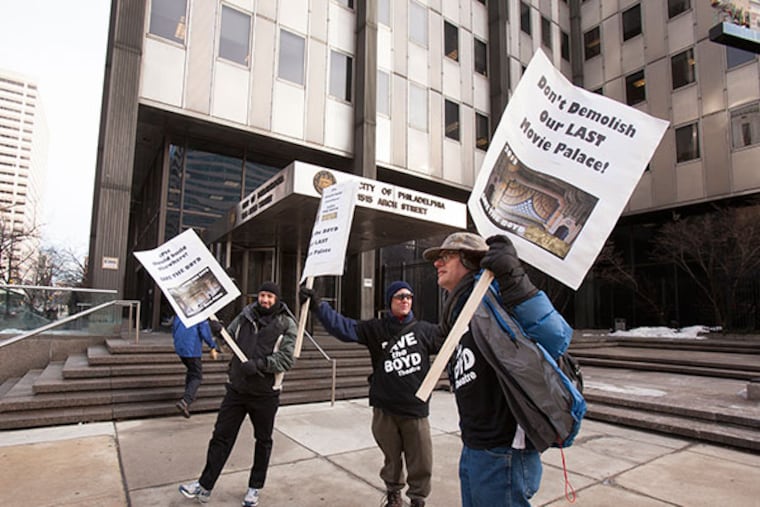Boyd Theater remains in limbo as hearing recesses without vote
PHILADELPHIA The fate of the historic Boyd Theater, Center City's imperiled onetime movie palace, remained in limbo Tuesday after a Philadelphia Historical Commission panel postponed taking a position on whether to recommend its demolition for redevelopment.

PHILADELPHIA The fate of the historic Boyd Theater, Center City's imperiled onetime movie palace, remained in limbo Tuesday after a Philadelphia Historical Commission panel postponed taking a position on whether to recommend its demolition for redevelopment.
The committee on financial hardship, whose recommendation must be issued before a final decision is made, heard from supporters and detractors before promising to continue the proceedings before the full commission meets to vote on Feb. 14.
The move ended four hours of testimony that began with a lengthy 9 a.m. presentation by Matthew McClure, lawyer for owner Live Nation and the cinema concern iPic-Gold Class Entertainment, arguing that demolition of a large portion of the theater was an economically feasible option where few others existed.
Preservationists disputed that claim and said demolition would be an irrevocable loss for the city.
The plan at issue is by developer Neal Rodin and is a linchpin of his $4.5 million agreement of sale for the property. Rodin would gut the auditorium of the single-screen movie palace, built in 1928, and replace the art deco interior of the L-shaped building with a two-story, eight-screen multiplex with reserved seating and a high-dining wing to be run by iPic. Rodin would restore the Boyd's badly obscured Chestnut Street facade.
"The conclusion is that there is no use to which the Boyd Theater can be reasonably adapted," said Peter Angelides, vice president of Econsult Solutions, whose financial analysis considered reuses such as the Boyd's remaining a single-screen theater or being converted to a venue for live productions.
He estimated that construction costs of $45 million to $52 million ($39 million to $45 million including tax incentives) would dwarf operating revenues and render the Boyd largely unprofitable.
"This application represents the best chance of making a compromise," said McClure, noting the failure of years of on-again, off-again redevelopment efforts of the roughly 20,000-square-foot building on the 1900 block of Chestnut.
Construction, engineering, and other consultants also reinforced the argument that the cost of a full restoration would outstrip the venue's capacity to be a self-sustaining business.
Committee member Robert Thomas could not help but ask: Why had Philadelphia, unlike many other major cities, been unable to preserve its premier downtown movie palace? What was missing?
"The Kimmel Center wasn't built without [public] subsidy," McClure replied. "There's choices. Anything is possible if you give someone money."
Preservationists said a lack of patience and public will had harmed preservation prospects.
"Almost every major U.S. city has a restored downtown movie palace," said Friends of the Boyd president Howard Haas. He then presented Historical Commission executive director Jonathan Farnham with more than 300 printed letters in support of the theater, which shut down in 2002 in a state of disrepair.
The Preservation Alliance's executive director, Caroline Boyce, took aim at Live Nation's construction estimates and questioned their accuracy.
"We do not believe the burden of proof has been met," Boyce said. She added that any analysis should also include the value of air development rights above the Boyd, considering that Center City real estate values are at all-time highs, according to commercial brokers.
Preservation Alliance attorney Leonard Reuter suggested that a limited restoration would be affordable. He noted that Live Nation, which runs old theaters across the country, including the TLA in Philadelphia and the Tower in Upper Darby, mounts live shows in theaters that have not been completely refurbished.
Onetime Boyd preservationist Sharon Pinkenson, who helped found Friends of the Boyd years ago and is credited with luring major films to shoot in Philadelphia over a long career as executive director of the Greater Philadelphia Film Office, threw her support to the Rodin plan.
"They're not asking for any public money for this project," Pinkenson told the committee. "What a breath of fresh air."
Added the film buff, who once lived across from the Boyd: "I never thought I would give up on the old gal."